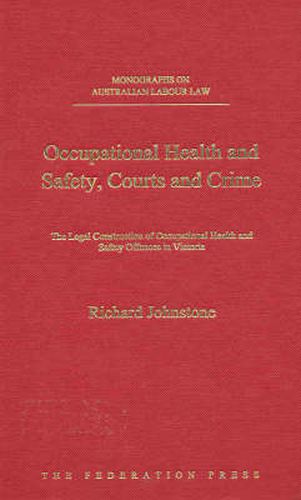Readings Newsletter
Become a Readings Member to make your shopping experience even easier.
Sign in or sign up for free!
You’re not far away from qualifying for FREE standard shipping within Australia
You’ve qualified for FREE standard shipping within Australia
The cart is loading…






This book reports on an empirically-based study of the manner in which the Magistrates’ Courts in Victoria, construct occupational health and safety (OHS) issues when hearing prosecutions for offences under the Victorian OHS legislation.
Prosecution has always been a controversial element in the enforcement armoury of OHS regulators, but at the same time it has long been argued that the low level of fines imposed by courts has had an important chilling effect on the OHS inspectorate’s enforcement approaches, and on the impact of OHS legislation.
Using a range of empirical research methods, including three samples of OHS prosecutions carried out in the Victorian Magistrates’ Courts, Professor Johnstone shows how courts, inspectors, prosecutors and defence counsel are involved in filtering or reshaping OHS issues during the prosecution process, both pre-trial and in court. He argues that OHS offences are constructed by focusing on events , in most cases incidents resulting in injury or death. This event-focus ensures that the attention of the parties is drawn to the details of the incident, and away from the broader context of the event. During the court-based sentencing process defence counsel is able to adopt a range of techniques which isolate the incident from its micro and macro contexts, thereby individualising and decontextualising the incident.
$9.00 standard shipping within Australia
FREE standard shipping within Australia for orders over $100.00
Express & International shipping calculated at checkout
This book reports on an empirically-based study of the manner in which the Magistrates’ Courts in Victoria, construct occupational health and safety (OHS) issues when hearing prosecutions for offences under the Victorian OHS legislation.
Prosecution has always been a controversial element in the enforcement armoury of OHS regulators, but at the same time it has long been argued that the low level of fines imposed by courts has had an important chilling effect on the OHS inspectorate’s enforcement approaches, and on the impact of OHS legislation.
Using a range of empirical research methods, including three samples of OHS prosecutions carried out in the Victorian Magistrates’ Courts, Professor Johnstone shows how courts, inspectors, prosecutors and defence counsel are involved in filtering or reshaping OHS issues during the prosecution process, both pre-trial and in court. He argues that OHS offences are constructed by focusing on events , in most cases incidents resulting in injury or death. This event-focus ensures that the attention of the parties is drawn to the details of the incident, and away from the broader context of the event. During the court-based sentencing process defence counsel is able to adopt a range of techniques which isolate the incident from its micro and macro contexts, thereby individualising and decontextualising the incident.